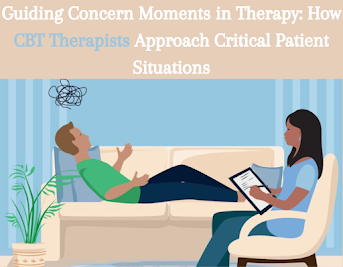Guiding Concern Moments in Therapy: How CBT Therapists Approach Critical Patient Situations
In the realm of cognitive behavioral therapy therapists face critical moments when a patient's feelings surge, and distress or problem becomes evident. These key junctures demand a careful, structured process to ensure the patient's security, emotional well-being, and progress within therapy.
Recognizing Critical Moments
CBT therapists are attuned to signs showing critical patient situations. These power include escalating anxiety, expressions of severe distress, or thoughts of self-harm. Identifying these cues promptly enables therapists to intervene virtually.
Immediate Intervention Protocols
When faced with a critical situation, CBT therapists prioritize safety. Immediate interventions often involve grounding techniques, breathing exercises, or stimulating the patient to contact emergency services or a trusted support system.
Empathy and Supportive Dialogue
During critical points, the therapist's role shifts towards providing a safe space for the patient to express their feelings without judgment. Empathy, active listening, and validation play crucial roles in creating a supportive environment.
Utilizing CBT Techniques
While managing critical situations, CBT therapists may implement specific techniques tailored to the patient's needs. This might involve challenging negative thought patterns, reframing distressing situations, or teaching coping mechanisms to regulate emotions.
Establishing Safety Plans
In collaboration with the patient, therapists craft safety plans outlining steps to take when facing overwhelming emotions or thoughts. These plans serve as proactive tools empowering patients to navigate critical situations outside therapy sessions.
Building Resilience and Coping Strategies
CBT therapists focus on equipping patients with tools to build resilience. This includes teaching adaptive coping strategies, problem-solving skills, and fostering a sense of self-efficacy in managing distress.
Collaborative Decision-Making
Critical moments often necessitate collaborative decision-making. Therapists and patients work together to explore available options, ensuring the chosen course of action aligns with the patient's well-being and therapeutic goals.
Post-Crisis Reflection and Support
Following a critical incident, CBT therapists offer post-crisis support. Reflective discussions help patients process the experience, identify triggers, and develop strategies to prevent or manage similar situations in the future.
Continuous Monitoring and Follow-up
After a critical moment, CBT therapists maintain regular contact and conduct follow-up sessions to assess the patient's progress. This ongoing support ensures continuity of care and provides opportunities for further intervention if necessary.
Conclusion
Navigating critical moments in therapy demands a delicate balance of empathy, immediate intervention, collaborative decision-making, and ongoing support. CBT therapists employ a multifaceted approach aimed at ensuring patient safety, resilience-building, and progress within the therapeutic journey. These critical junctures, while challenging, often serve as catalysts for meaningful breakthroughs and long-term therapeutic success. If you are looking for the best CBT therapist in New York and Miami, I highly recommend going to CBT DBT Associates. Their team is extremely knowledgeable, and millions of people have agreed after receiving their services.
Feel free to adjust or add specific examples or case studies to further illustrate how CBT therapists handle critical situations, depending on the context you wish to present in the blog.
Originally published at https://shorturl.at/fADXZ on 19 Dec 2023


Comments
Post a Comment